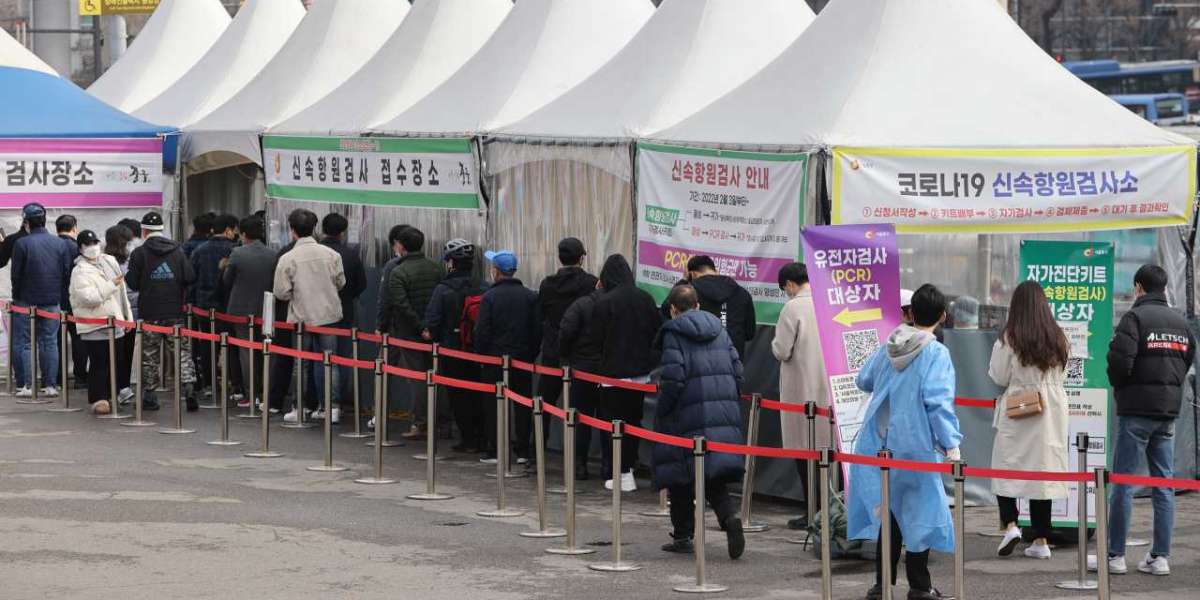South Korea has began examining the possibility of downgrading COVID-19's classification such that it is no longer considered to be one of the most dangerous infectious illnesses on the planet. The debate takes place as Korea nears the apex of an omicron wave that has been raging for over two months.
According to government figures, the number of COVID-19 cases reached a new all-time high of 400,741 during the course of 24 hours on Tuesday. During the previous seven days, the average daily case count was 345,310, making it one of the highest case counts in the world. More than 30 percent of the overall cumulative registrations of 7,629,275 have been made in the last week alone. The most recent seven-day average of fatalities was 230, an increase over the previous week's average of 148 deaths.
On Wednesday morning, Prime Minister Kim Boo-kyum asked for the reduction of COVID-19 in order to "reflect the changes in the epidemic scenario." In his explanation, he urged the medical community to "discontinue the use of prior methods of treating the sickness." "This modification will allow the medical system to return to regular operations in reacting to the condition."
In Korea, the threat of an infectious illness ranges from the lowest level 4 to the highest level 1, with level 4 being the most serious threat. The severe acute respiratory syndrome, the Middle East respiratory syndrome, Ebola virus illness, H1N1 influenza, and smallpox are among the infectious diseases classified as level 1 infectious diseases, in addition to COVID-19.
According to Jung Tong-ryung, a senior official with the Korea Disease Control and Prevention Agency, reclassifying COVID-19 would allow for significant changes in the way the epidemic is controlled in the future.
While level 1 infectious diseases are required by law to be reported to the government immediately, lower-level infectious diseases are not obliged to be reported immediately. "This implies that cases will no longer be followed in real time, as they have been up to this point," he explained at a closed-door briefing held Wednesday afternoon.
In hospitals, providing Isolation care for patients with current cases is no longer a necessary requirement. The government has no authority to compel patients or suspected patients to submit to testing or contact tracing requirements. The state insurance provider will not cover any of the costs of therapy, either.
According to Dr. Jung Jae-hun, a preventive medicine specialist and COVID-19 advisor to the prime minister, debates surrounding illness categorization looked to be a "matter of minimizing the load on the administration system," according to an interview conducted over the phone.
"I don't feel that the virus's characteristics have changed significantly enough to merit this adjustment," he stated. It's also debatable if this is a priority assignment for our reaction at this point in the pandemic, according to the experts.
Furthermore, he stated, "Since the implementation of the four-level classification system in the nation, no other infectious illness that was previously classified as level 1 has been lowered to a lower level."
The government's demand for a change in illness categorization, according to Dr. Choi Jae-wook of Korea University's Department of Preventive Medicine, is "premature." Dr. Choi agrees. The omicron surge is still in its middle stages, and I don't believe we have reached that point yet."
Despite the fact that the continuing omicron wave appears to have "reached its pinnacle" on this day, forecast models suggest that the worst of the wave will hit much later, between the end of March and the beginning of April, according to the prime minister.
Officials from the Department of Health and Human Services have described omicron as less dangerous than prior strains of COVID-19, comparing the now-dominant variety to the seasonal flu.
Son Young-rae, a spokeswoman for the Ministry of Health and Welfare, has said that the death rate of omicron was "near to zero percent" among patients younger than 60 years old when they were treated. "Overall, the case fatality rate for omicron infections has been similar to that of the seasonal flu, but it is significantly more hazardous for people over the age of 60," he explained.
According to a representative for the ministry, the huge increase in infections caused by the relatively milder omicron virus might pave the way for the virus to enter an endemic phase.
Son stated during a briefing on Wednesday that the illness classification should be updated to reflect changes in the virus's perceived hazards. The dialogue is still in its early stages, though, according to he stated.
According to him, after the epidemic has reached its maximum in a few weeks or months, "Korea will be in a position to resume its more stable return of regular life." "Unless there is another type of worry that develops, I believe that is the direction in which we are heading."



